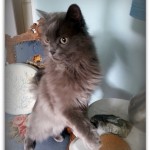Will my cat love a Cat Sitter?
Here are some reasons you should hire a cat sitter instead
of sticking your kitty in a cattery:
- Cats love routine.
- Cats are territorial.
- Cats need one-on-one social interaction.
- You will not have to transport them – they stay in their own environment.
- There’s no place like home.
 Cats
are now, even more popular than dogs to own. It is even more common to
see multiple cats in the home today. Cats are more territorial than
dogs. It is important to know that cats are not keen to change in
routine or forced removal from familiar surroundings. With this being
said, pet sitting versus
boarding is the best solution for the healthy cat. A professional cat
sitter will give your cat the attention they need. Whether it’s getting
ear scratches or playing with a favorite toy. We spoil kitties. A
professional cat sitter can provide the same love and care they get when
you’re at home.
Cats
are now, even more popular than dogs to own. It is even more common to
see multiple cats in the home today. Cats are more territorial than
dogs. It is important to know that cats are not keen to change in
routine or forced removal from familiar surroundings. With this being
said, pet sitting versus
boarding is the best solution for the healthy cat. A professional cat
sitter will give your cat the attention they need. Whether it’s getting
ear scratches or playing with a favorite toy. We spoil kitties. A
professional cat sitter can provide the same love and care they get when
you’re at home.- Points to Remember.
- Functions and Activities to Monitor.
- Identifying the signs of Illness or Injury.
Typically the healthy cat won’t get themselves into as much trouble as canines when they are left alone in a home. However, cats do miss their owners. Because of their territorial instinct, they handle their owners being away from home better than dogs.
For more info visit- http://www.2pawsupinc.com



Comments
Post a Comment